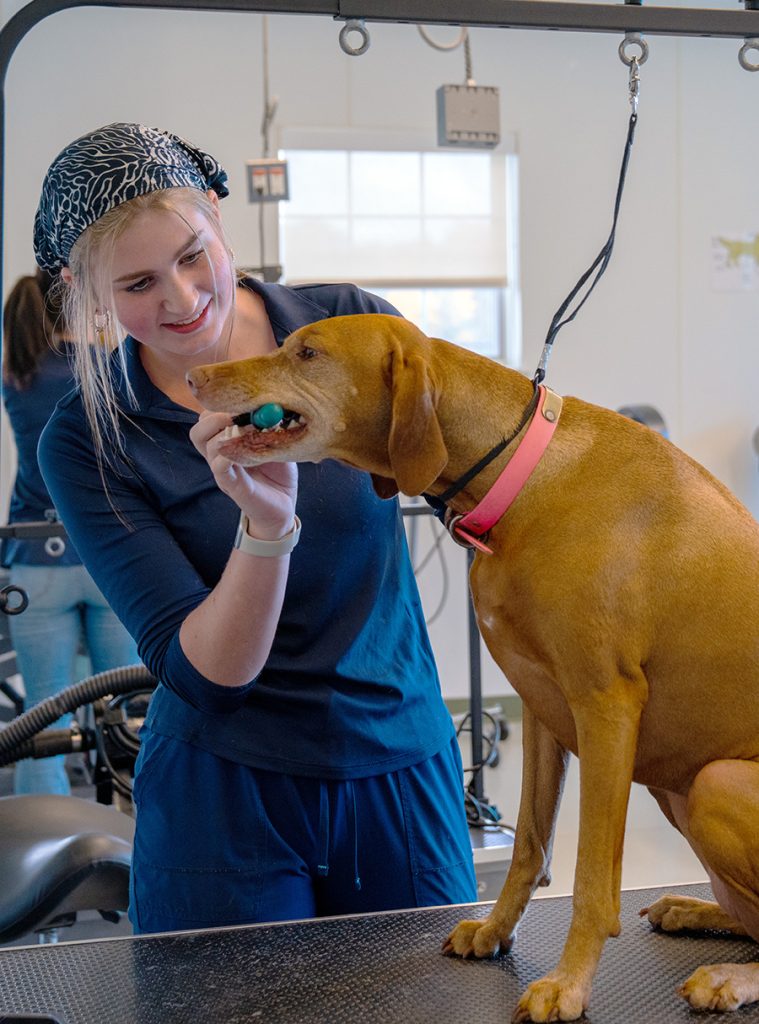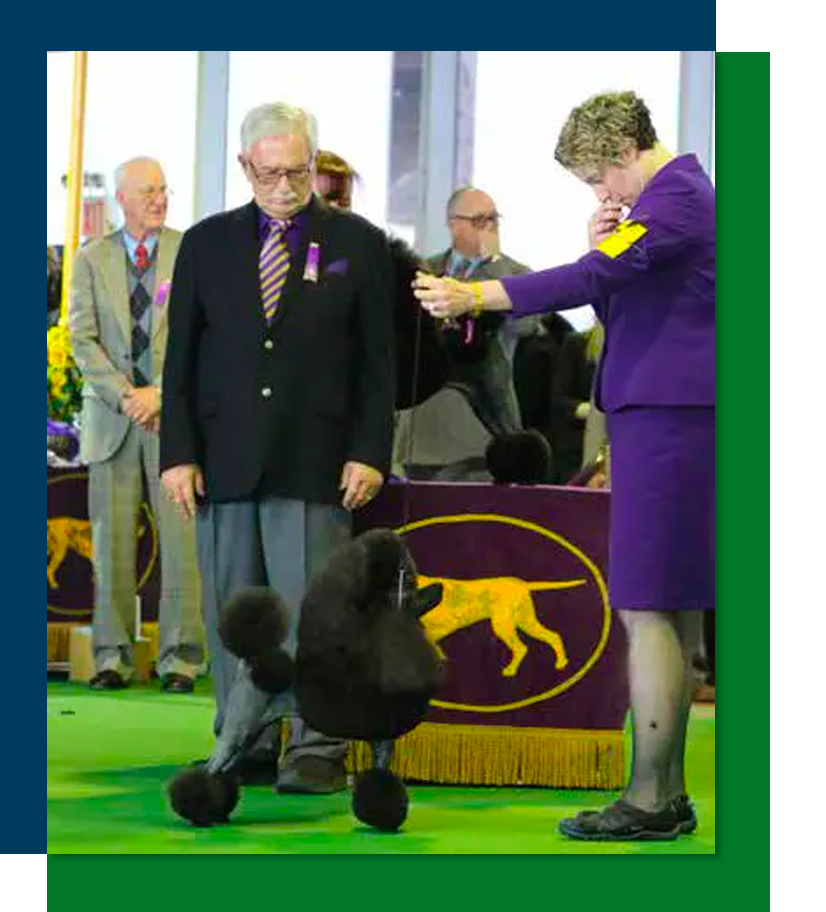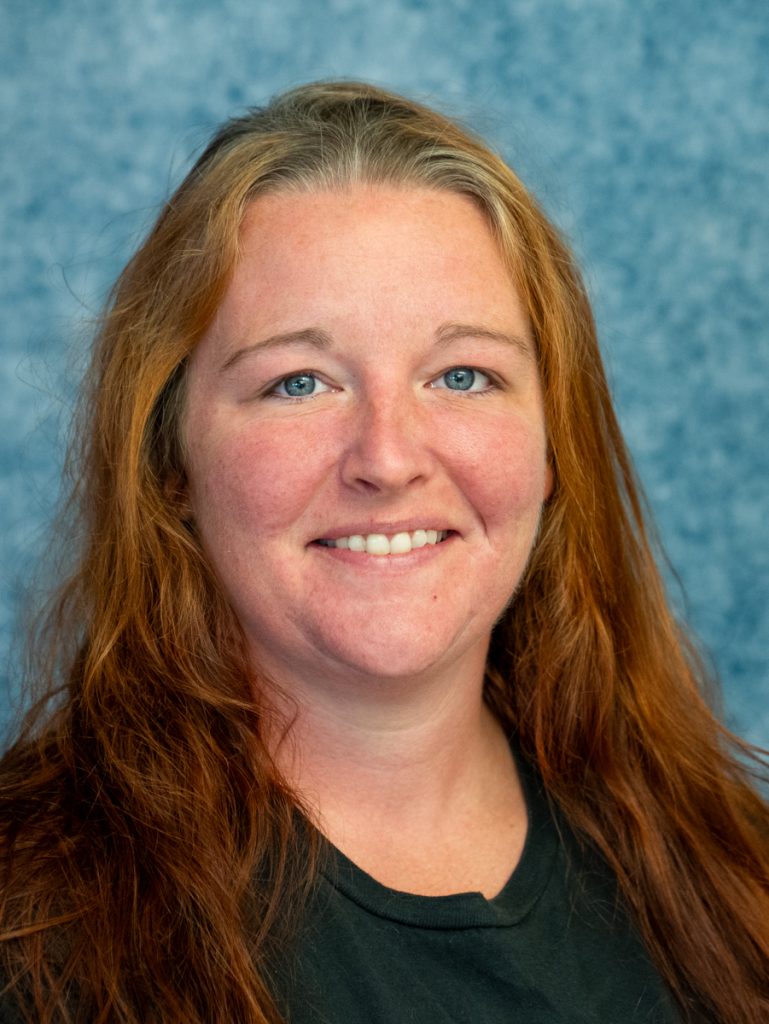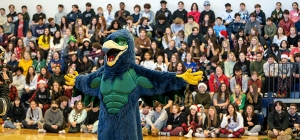Animal Science
Companion Animals
About This Program
The Companion Animals program is designed to give students hands-on and theory-based learning in the areas of animal health & nutrition, behavior & training, and animal grooming & husbandry. This program will teach students a variety of companion animal skills such as restraints, breed ID, proper breeding technique, breed handling styles, pet grooming, care, and maintenance while working with rodents, reptiles, dogs, cats, and fish. Students will develop skills pertaining to basic grooming, an understanding of training theories, and gain knowledge of basic animal nutrition requirements, and anatomy and physiology theory. Students will practice customer service skills and understand the role and responsibilities of an effective employee in the companion animal industry. Each student will have the opportunity to earn an OSHA 10 hour card, and be certified to practice canine and feline CPR and first aid. See below for full course description.

Career Paths
- Groomer
- Trainer
- Vet Assistant
- Pet Shop Associate, Manager, Owner
- Dog Day Care/Kennel Attendant
- Animal Food Sales/Supplies Representative
- Breeder
- Handler Animal Control Officer
- Military Dog Handler
- Pet Photographer
- Nutritionist
- Behaviorist
Industry Partnerships
- Groomtown
- Best in Show Grooming
- GCAD Service Dogs
- Walk-A-Pup
- Andover Animal Hospital
- Best Friends Pet Hotel
- The National FFA Organization
Certifications
- OSHA 10 Hour General Industry
- Pet First Aid/CPR
- American Kennel Club CGC Certificate
Articulation Agreements
- University of New Hampshire (pending)
- North Shore Community College-Danvers
- Unity College
Advisory Committee Members
- Yana Carlson, Walk-A-Pup
- Cailen Pillsbury, Reading Animal Clinic
- Jason Psalidas, New England Veterinary Hospital
- Destiny Walker
- Amanda Watson, Mass Veterinary Referral Hospital
Meeting Documents
- Companion Animals Fall 2017 PAC Meeting-Minutes
- Companion Animals Fall 2018 Meeting Minutes
- Companion Animals Fall 2019 PAC Meeting Mins.
- Companion Animals Fall 2022 PAC Minutes
- Companion Animals Spring 2019 PAC Meeting Minutes
- Companion Animals Spring 2019 PAC Meeting Minutes
- Companion Animals Spring 2022 PAC Minutes

Student Outcomes
Julie Pantages, Class of 1996
Where are they now? Best in Show Grooming
What is their job title? Business Owner
“Essex North Shore taught me the foundational skills that I needed to further my education in my field after high school and eventually open a successful business and be self-employed.”
Meet the Companion Animals Teachers

Ms. Danielle Holbrook
Teaching Assistant for Animal Science Program
DHolbrook@essextech.net

Ms. Jacqueline Pierce
Animal Science Teacher
jpierce@essextech.net

Ms. Emily Serson Eastman
Animal Science Teacher
ESerson-Eastman@essextech.net
Companion Animals Course Descriptions
| Course Number | Name | Credit | Grade Level | |||
|---|---|---|---|---|---|---|
| coa101 | Companion Animals Exploratory 9 | 1.0 | Grade 9 | |||
| coa103 | Companion Animals 9 | 10.0 | Grade 9 | |||
| coa201 | Introduction to Grooming 10 | 4.0 | Grade 10 | |||
| coa202 | Companion Animals Anatomy & Physiology 10 | 6.4 | Grade 10 | |||
| coa203 | Companion Animals Health and Nutrition 10 | 9.6 | Grade 10 | |||
| coa301 | Grooming Maintenance and Management 10 | 10.4 | Grade 11 | |||
| coa302 | Animal Breeding/Training/Showing I 11 | 9.6 | Grade 11 | |||
| coa305 | Companion Animals Cooperative Education 11 | 12.0 | Grade 11 | |||
| coa306 | Companion Animals Theory 11 | 4.0 | Grade 11 | |||
| paa301 | CTE Pathway: Communication & Essential Skills | 2.0 | Grade 11 | |||
| paa302 | CTE Pathway: Animal Ethics & Agricultural Laws | 2.0 | Grade 11 | |||
| coa401 | Advanced Grooming 12 | 10.4 | Grade 12 | |||
| coa402 | Animal Breeding/Training/ Showing II 12 | 9.6 | Grade 12 | |||
| coa405 | Companion Animals Cooperative Education 12 | 24.0 | Grade 11 | |||
| coa406 | Companion Animals Theory 12 | 4.0 | Grade 12 | |||
| paa401 | CTE Pathway: Laboratory Skills for Animal Sciences | 2.0 | Grade 12 | |||
| paa402 | CTE Pathway: Applied Mathematics in the Animal Sciences | 2.0 | Grade 12 |
Companion Animals Exploratory 9
Course # coa101 | Credits: 1
This five-day cycle exploratory course introduces grade 9 students to the companion animals field. Students will learn about the different aspects and careers offered within the CTE area. Students will explore rodents, reptiles, birds, equine, livestock, specialty animals, dogs, cats, and fish. Topics will include safety, behavior, handling, proper management, health issues, and housing.
Companion Animals 9
Course # coa103 | Credits: 10
This semester-based course prepares students for the first steps in entering into the Companion Animals program. Students will explore the ability to perform skills that are associated with the required competencies of animal science. They will learn the attitudes consistent with those expected of an individual working in the animal industry and general society. In addition, students will develop an understanding of all proper animal housing, breeds, and handling. Students will be expected to apply basic skills related to reading, writing, science, mathematics, and communication.
Introduction to Grooming 10
Course # coa201 | Credits: 2.4
This full-year course will cover the basic concepts relating to animal grooming in order to prepare the students for full grooming sessions. Topics will include: proper sanitation, tool identification, use, and maintenance. Students will learn about the safety of the groomer and pet along with appropriate techniques for grooming, bathing, nail clipping, ear cleaning, and drying. Students will study basic anatomy and health conditions commonly seen in the industry. The course concludes with a focus on customer service and phone etiquette.
Companion Animals Anatomy & Physiology 10
Course # coa202 | Credits: 6.4
This full-year course will introduce students to the anatomy and physiology of the following animal systems: musculoskeletal, circulatory, respiratory, renal, nervous, reproductive and endocrine. Students will also learn about directional anatomical terms and the external anatomy of large and small animals.
Companion Animals Health and Nutrition 10
Course # coa203 | Credits: 11.2
This full-year course will teach students the basic concepts relating to office, retail, and service skills associated with the companion animal industry. Students will practice computer skills, create advertising and learn about greeting customers. Students will also learn about safety in the workplace and the specific challenges associated with housing and caring for animals in a retail operation. Topics will include problems with overpopulation and overcrowding,; the maintaining of animal health records; and the ethics of animal euthanasia. Students will also explore basic animal health and nutrition, including the anatomy and physiology of the digestive and immune systems. Major topics will also include: feedstuffs, nutrients, digestion, nutrient requirements, nutritional disorders and deficiencies. Students will understand immunology with a focus on common infectious diseases, parasites, and vaccine technology. Proper environmental conditions for the animal health will also be a focus. This course will provide knowledge in disease and parasitology prevention and treatment, proper animal restraint, physical exams, and pet first aid.
Grooming Maintenance and Management 11
Course # coa301 | Credits: 8.8
This full-year course will expand upon the foundation of knowledge gained during Introduction to Grooming 10. Students will learn about risks and liabilities related to the grooming industry. They will identify design concepts of grooming establishments, plus the pros and cons about mobile grooming. Students will investigate the benefits of memberships in professional organizations including New England Pet Grooming Professionals and the National Dog Grooming Association of America. Students will learn the fundamentals of electric clippers, including safe use, storage, maintenance, blade selection, and care as well as the use of snap-on combs. Students will use this knowledge to build upon their grooming skills.
Animal Breeding/Training/Showing I 11
Course # coa302 | Credits: 11.2
This full-year course will introduce students to the fundamentals of animal training, showing, and breeding. Students will develop an understanding of learning theory with a focus on using science-based positive reinforcement techniques. During weekly labs, students will focus on basic obedience and Canine Good Citizen training through the application of various training strategies used in the canine industry. Coursework will also include AKC breed characteristics and identification, companion animal showing practices, and pet therapy. In addition, students will learn about concepts and practices related to the selection, breeding, and management of dogs such as basic genetics and puppy development.
Companion Animal Theory 11
Course # coa306 | Credits: 4
This full-year, classroom-based course will examine animal health & nutrition, behavior & training, and animal grooming & husbandry. Students will develop skills pertaining to basic, and breed specific, grooming, an understanding of training theories, including agility, obedience, CGC (Canine Good Citizen), and gain knowledge of basic animal nutrition requirements, and anatomy and physiology theory.
Companion Animals Cooperative Education 11
Course # cos305 | Credits: 12
This semester-based course provides qualified students with a career technical employment opportunity. The program is designed to allow students on-the-job training by involving them in work that is directly related to their technical area of study. Cooperating employers provide additional training, pays students, and reports their performance to the school for every cycle. Please note that juniors are eligible for Cooperative Education during third and fourth quarters only.
Advanced Grooming 12
Course # coa401 | Credits: 11.2
The full-year course will focus on student-driven learning through projects and hands-on learning for students. Students will enhance their customer service skills by performing manager skills as if managing a grooming salon. They will also continue refining their grooming skills while learning new pet styles and products within the industry. Students will identify the process to start a salon and will learn about additional career options in the grooming industry. Students will design a grooming salon as well as a price list and grooming kit and develop several career skills protocols as well as complete the final components of their grooming portfolios.
Animal Breeding/Training/ Showing II 12
Course # coa402 | Credits: 8.8
This full-year course will continue to enhance and refine student knowledge of animal training, showing, and breeding while setting students up to pursue industry certifications post-graduation. Students will advance their understanding of learning theory, demonstrate advanced obedience training techniques, and train for sports such as rally and agility. Classwork and labs will also cover service dog training, performance sports, and advanced showmanship techniques. In addition, students will learn to select breeding stock based on breed standards and health clearances that will help them to develop breeding contracts and design breed-specific whelping boxes.
Companion Animal Theory 12
Course # coa406 | Credits: 4
This full-year, classroom-based course will examine animal agribusiness skills, competing with and showing companion animals, advanced training of companion animals and advanced grooming skills. Students will develop advanced skills pertaining to the grooming industry and business ownership, breeding care and maintenance of companion animals and animal health and disease control.
Companion Animals Cooperative Education 12
Course # cos405 | Credits: 24
This full-year course provides qualified students with a career technical employment opportunity. The program is designed to allow students on-the-job training by involving them in work that is directly related to their technical area of study. Cooperating employers provide additional training, pays students, and reports their performance to the school for every cycle.





